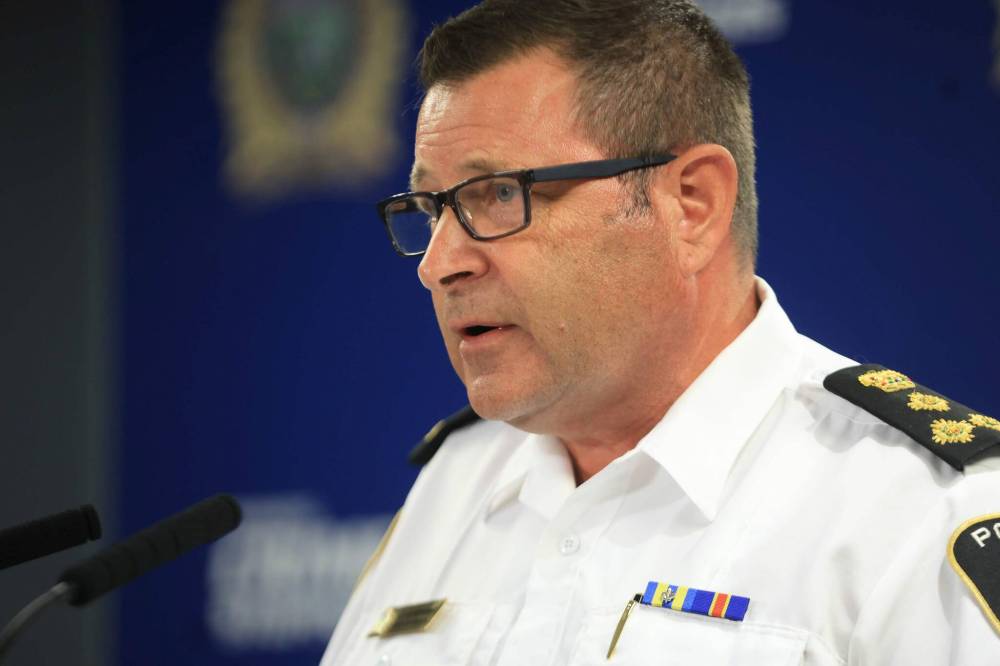Police discipline should not be hidden from the public
Advertisement
Read this article for free:
or
Already have an account? Log in here »
To continue reading, please subscribe:
Monthly Digital Subscription
$0 for the first 4 weeks*
- Enjoy unlimited reading on winnipegfreepress.com
- Read the E-Edition, our digital replica newspaper
- Access News Break, our award-winning app
- Play interactive puzzles
*No charge for 4 weeks then price increases to the regular rate of $19.00 plus GST every four weeks. Offer available to new and qualified returning subscribers only. Cancel any time.
Monthly Digital Subscription
$4.75/week*
- Enjoy unlimited reading on winnipegfreepress.com
- Read the E-Edition, our digital replica newspaper
- Access News Break, our award-winning app
- Play interactive puzzles
*Billed as $19 plus GST every four weeks. Cancel any time.
To continue reading, please subscribe:
Add Free Press access to your Brandon Sun subscription for only an additional
$1 for the first 4 weeks*
*Your next subscription payment will increase by $1.00 and you will be charged $16.99 plus GST for four weeks. After four weeks, your payment will increase to $23.99 plus GST every four weeks.
Read unlimited articles for free today:
or
Already have an account? Log in here »
It sounds like the kind of thing you’d see in a gritty crime drama out of 1970s Chicago.
Veteran police officers actually on the wrong side of the law, dealing drugs and taking part in break-and-enters and extortion — even taking pictures of a half-clad deceased woman and sharing them with others. Stealing police ammunition from training sessions and passing it on to people outside the police force, and sharing confidential police information with other outsiders.
Those are some of the allegations, and criminal charges, levelled against Const. Elston Bostock, a 22-year veteran of the Winnipeg Police Service. The charges against Bostock were announced Thursday by WPS Chief Gene Bowers, along with a slew of other charges for three other general patrol officers, some of whom are alleged to have been working in concert with Bostock.

Ruth Bonneville/Free Press
Winnipeg Police Chief Gene Bowers
“These are very serious allegations which go directly against the values of the Winnipeg Police Service, tarnishing our reputation and eroding the public’s confidence,” Chief Bowers told a news conference, calling it a “very sad day for the service.”
Absolutely true. Now, the vast majority of upstanding WPS officers will bear a stain on their collective reputations for the actions of a very few.
Actions, by the way, that allegedly stretch back for years.
Part of Chief Bowers’ comments on the charges yesterday included the fact that he has written to Justice Minister Matt Wiebe to establish a uniform code of conduct for police, and to give the WPS the ability to publicly disclose disciplinary actions taken against officers.
Wiebe has agreed with the idea of the uniform code of conduct and says his department is working to put such a code together. But he’s been remarkably non-committal on the idea of releasing the results of disciplinary actions.
Winnipeg Police Union President Corey Wiles, meanwhile, took a different view.
“I expect (Bowers) also recognizes that, whatever he is looking at, the (Winnipeg Police Union) will always act to ensure the privacy rights of its members — just like the members of other public-sector unions, and just like those of individual Canadians — are always respected.”
With all due respect to privacy rights, those rights don’t extend unilaterally to those in a position of power who have been found to have abused that position.
When the medical establishment sits in judgment on the conduct of doctors, keeping those decisions confidential does nothing to build trust. Keeping misconduct by teachers out of the public eye? It creates the same lack of confidence in the process.
That’s why the Free Press has steadfastly argued for disciplinary actions to be publicly available across a broad spectrum of professions.
Not to identify victims or to put their mistreatment on show, but to demonstrate to the public that improper actions have clear consequences, even when someone in a position of trust and power is the one who is committing them.
Keeping disciplinary action under wraps does nothing to build confidence in the disciplinary process — in fact, it can make those who file complaints feel as though those conducting the investigation are on the side of the alleged offender. And it makes other victims feel as though the deck is stacked against them before they even start.
Chief Bowers is making the right move, even though it is likely to be unpopular within his own force. Justice Minister Wiebe should make the right move as well, and act to make disciplinary decisions public.
And police union president Wiles should recognize that hiding police malfeasance undermines public trust in each and every one of his union members.
Sunshine disinfects, as the saying goes. And this particularly rank little abscess in the police service is overdue for both a lancing and some permanent, public confidence-building sunlight.




